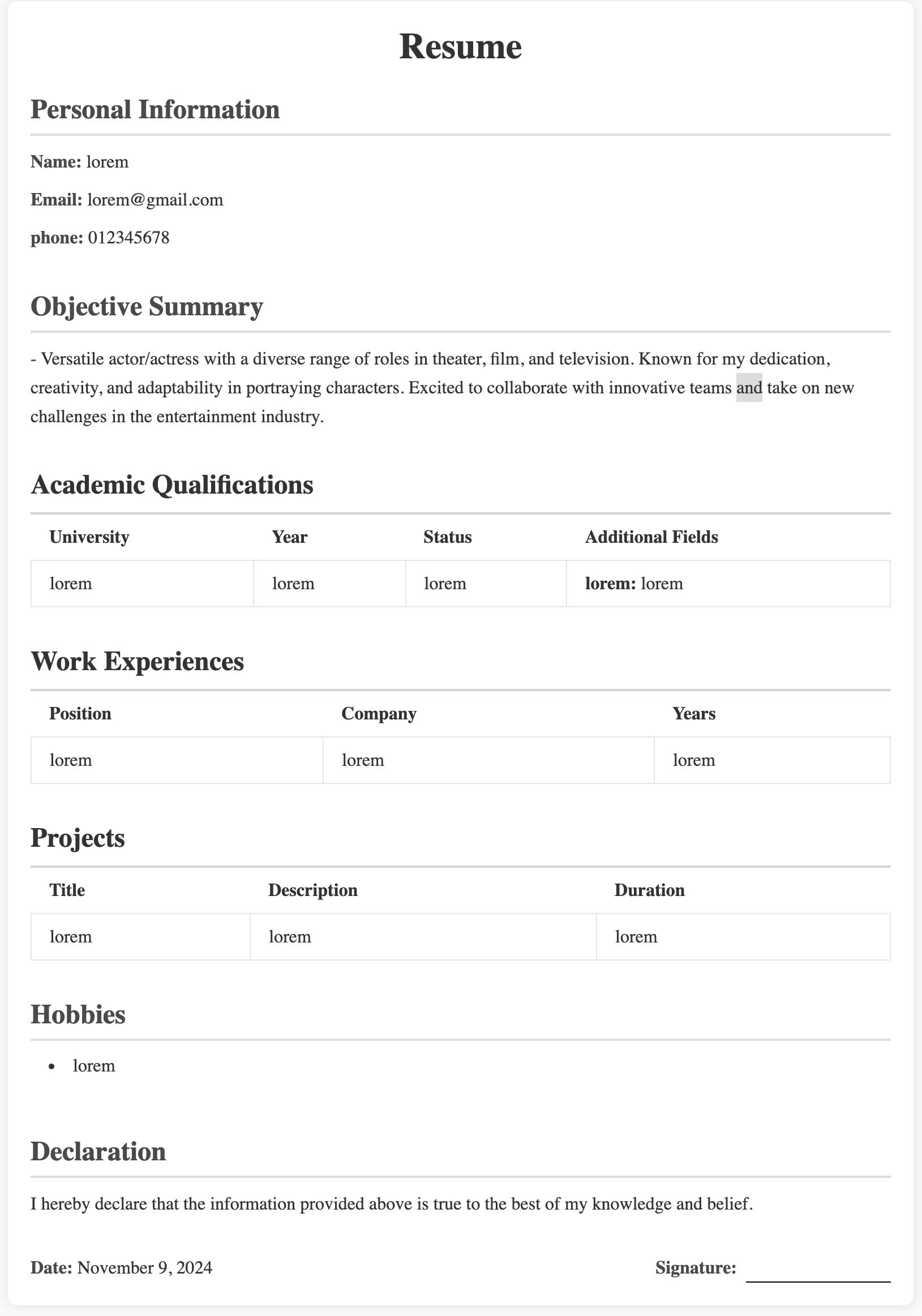Resources/Resume-Guide/Economist
Economist CV Guide with Free Resume Template
An economist studies the production and distribution of goods and services. They analyze and research economic issues like inflation, consumer demand, and unemployment. They also develop economic models and forecasts to help governments, businesses, and individuals make better decisions.
1. Contact Information
- Full Name
- Phone Number
- Email Address
- LinkedIn Profile (optional)
- Portfolio/Website (optional)
2. Summary/Objective (Optional)
A concise summary of your qualifications. Focus on your strengths, such as economic research, statistical analysis, or policy development. Example:
“Experienced economist with a strong background in economic modeling, data analysis, and policy evaluation. Proven ability to apply economic principles to real-world challenges and generate insights that inform decision-making.”
3. Education
List your degrees, including the institution, graduation year, and major (if relevant). You can also mention specific coursework that’s relevant to economics.
Example:
- PhD in Economics — University of XYZ, 2020
Thesis: “Impact of Trade Policies on Emerging Economies” - Bachelor of Arts in Economics — University of ABC, 2016
4. Skills
Include both technical and soft skills. Some key skills for an economist may include:
- Quantitative Analysis
- Statistical Software (e.g., R, Stata, SPSS, SAS)
- Economic Modeling & Forecasting
- Data Visualization (e.g., Tableau, Excel)
- Policy Analysis
- Research Methodologies
- Communication Skills (for explaining complex data to non-experts)
5. Experience
Emphasize work experience related to economics, such as research positions, internships, or roles in consulting, government, or the private sector. For each position, include the following:
- Job Title
- Company/Organization
- Dates of Employment
- Key Responsibilities and Achievements
Example:
Economic Analyst — XYZ Research Institute, Jan 2021 – Present
- Conducted econometric analysis using regression models to forecast market trends.
- Collaborated with policymakers to develop economic reports and policy recommendations.
- Utilized data visualization tools to present findings in a clear and accessible way to stakeholders.
6. Research and Publications (if applicable)
If you have any research papers, publications, or reports you’ve worked on, list them here. This is particularly important if you have advanced degrees or a background in academia.
Example:
- “The Economic Effects of Automation in Manufacturing,” Journal of Economic Research, 2023
- Co-authored a policy report on the implications of monetary policy changes for emerging economies, published by the Institute for Policy Analysis.
7. Certifications & Training
- Include relevant certifications or specialized training, such as:
- Certified Business Economist (CBE)
- Advanced econometrics or data analysis courses (Coursera, edX)
8. Awards & Honors (if applicable)
Mention any accolades, fellowships, or scholarships you’ve received related to economics.
9. Languages (optional)
If you speak any foreign languages, especially those that are relevant to international economics, include them here.
10. Professional Affiliations (optional)
List memberships in professional organizations, such as:
- American Economic Association (AEA)
- National Association for Business Economics (NABE)
Formatting Tips:
Keep the resume clear and concise, ideally fitting within one page for less experienced candidates or up to two pages for those with more experience.
Tailor your resume for each job you apply to by emphasizing the most relevant skills and experiences.
Use action verbs to describe your achievements (e.g., “analyzed,” “developed,” “forecasted”).
Quantify results where possible (e.g., “Increased efficiency by 25% through data-driven decision-making”).

Recent Categories
- General
- Accountant
- Actor/Actress
- Administrator
- Advertising Executive
- Aerospace Engineer
- Agricultural Engineer
- Air Traffic Controller
- Aircraft Mechanic
- Ambulance Driver
- Animator
- Architect
- Artist
- Astronomer
- Athlete
- Attorney/Lawyer
- Audiologist
- Author
- Baker
- Banker
- Barista
- Bartender
- Biologist
- Biomedical Engineer
- Bookkeeper
- Brand Manager
- Bus Driver
- Business Analyst
- Butcher
- Carpenter
- Chef
- Chemical Engineer
- Chemist
- Chiropractor
- Civil Engineer
- Claims Adjuster
- Clinical Psychologist
- Coach
- Computer Engineer
- Computer Operator
- Copywriter
- Cosmetologist
- Costume Designer
- Court Reporter
- Dancer
- Dental Assistant
- Dentist
- Dermatologist
- Detective
- Dietitian
- Director
- Dispatcher
- DJ
- Doctor
- Economist
- Editor
- Electrician
- EMT
- Engineer
- Environmental Scientist
- Event Planner
- Executive Assistant
- Fashion Designer
- Film Director
- Financial Advisor
- Firefighter
- Fitness Trainer
- Flight Attendant
- Florist
- Forensic Scientist
- Game Developer
- Gardener
- Geologist
- Graphic Designer
- Hair Stylist
- Handyman
- Health Educator
- Home Inspector
- Hotel Manager
- HR Manager
- Illustrator
- Industrial Designer
- Information Security Analyst
- Insurance Agent
- Interior Designer
- Interpreter
- Investment Banker
- IT Manager
- Journalist
- Judge
- Laboratory Technician
- Landscaper
- Librarian
- Linguist
- Loan Officer
- Lobbyist
- Locksmith
- Logistician
- Makeup Artist
- Manager
- Marine Biologist
- Market Research Analyst
- Massage Therapist
- Mathematician
- Mechanic
- Medical Assistant
- Medical Biller
- Medical Coder
- Medical Interpreter
- Medical Transcriptionist
- Meteorologist
- Microbiologist
- Model
- Mortician
- Musician
- Nanny
- Network Administrator
- Nurse
- Nutritionist
- Occupational Therapist
- Office Manager
- Optician
- Optometrist
- Painter
- Paralegal
- Paramedic
- Pediatrician
- Personal Trainer
- Pharmacist
- Phlebotomist
- Photographer-option
- Publisher
- Radiologist
- Real Estate Agent
- Receptionist
- Recreation Worker
- Recruiter
- Registered Nurse
- Reporter
- Research Scientist
- Respiratory Therapist
- Retail Salesperson
- Robotics Engineer
- Sales Manager
- School Counselor
- Scientist
- Secretary
- Security Guard
- Server
- Set Designer
- Social Worker
- Software Developer
- Speech Pathologist
- Statistician
- Stockbroker
- Stylist
- Surgeon
- Surveyor
- System Administrator
- Tax Preparer
- Teacher
- Technical Writer
- Telecommunications Specialist
- Therapist
- Tour Guide
- Translator
- Truck Driver
- Ultrasound Technician
- Urban Planner
- Usher
- Veterinarian
- Video Editor
- Waiter/Waitress
- Web Developer
- Welder
- Writer
- Yoga Instructor